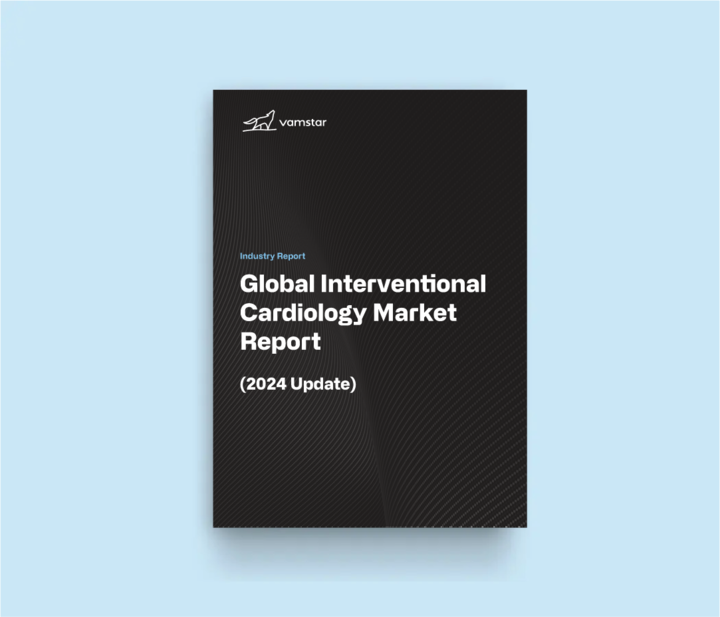Category: Market Intelligence
4 minutes read
Revolutionising Tender and RFP Management with AI

A Game-Changer for Enterprises
In today’s competitive business landscape, effective tender and RFP (Request for Proposal) management is crucial for large enterprises, particularly in highly regulated industries like healthcare, medical devices, and pharmaceuticals. Yet, many organisations grapple with the increasing complexity and volume of tenders and RFPs, leading to missed opportunities, inefficiencies, and suboptimal outcomes.
Navigating these complexities is vital for large enterprises, especially within the healthcare, medtech, and pharmaceutical sectors. This article explores the challenges these industries face and how AI (Artificial Intelligence) can revolutionise the process, significantly enhancing efficiency and success rates.
Key Insights
Revenue impact is substantial, with large medtech and pharma companies allocating 3-5% of their revenue annually to tender and RFP activities. Sales teams often spend up to 50% of their time on administrative tasks rather than strategic selling. Manual processes contribute to missed opportunities, pricing errors, and a lack of market intelligence. By contrast, AI can dramatically improve these outcomes by reducing tender and RFP cycle times by 60-70%, increasing win rates by 15-20%, and delivering an ROI of 10-15x within 12-18 months.
This strategic framework aims to guide enterprises in harnessing AI to streamline the entire tender and RFP lifecycle, from opportunity identification to contract management, ensuring substantial growth and cost savings.
Transformative Benefits of AI in Tender and RFP Management
AI-powered systems bring enhanced market visibility, automatically tracking thousands of global tender sources to ensure no opportunities are missed. By automating tedious tasks, AI frees up sales teams to focus on high-value activities. AI-powered analytics enable more accurate win probability predictions and optimised pricing strategies, leading to data-driven decision making. Intelligent authoring tools and content reuse capabilities accelerate proposal development, while automated checks and proactive alerts help manage compliance risks.
Leveraging historical data and market intelligence, AI crafts more competitive and tailored responses, leading to increased win rates. Continuous improvement is driven by machine learning algorithms that capture insights from each tender, enhancing ongoing performance.
Register to continue reading.
7 minutes read
Navigating the AI Disruption in Healthcare & Life Sciences: A Survival Guide

The AI revolution is poised to transform the pharmaceutical, medtech, life sciences, and healthcare industries by enhancing operational efficiencies, driving innovation, and accelerating time to market.
However, without proper strategies to ground data in these specific contexts, the potential benefits could lead to significant financial losses and cost overruns. Find out why below.
Importance of Industry-Specific Grounding
Importance of Industry-Specific Grounding
1. Relevance and Accuracy of Data
AI systems in healthcare rely heavily on data to learn and make decisions. If the data is not grounded in the specific context of the industry, the AI models may produce irrelevant or inaccurate results.
For example, an AI system trained on generic medical data might not understand the nuances of patient records, leading to incorrect diagnoses or treatment recommendations.
This can result in costly errors and inefficiencies. Similarly, for sales and commercial data, the context of industry specific nomenclature, syntax, and relationships across datasets is not taken into account then the results will be very poor and execution extremely costly.
2. Operational Efficiency
AI aims to improve operational efficiency by automating processes and providing insights. However, without industry-specific grounding, AI systems may fail to understand the unique operational challenges and requirements of the healthcare sector.
For instance, an AI system designed for general supply chain management might not account for the stringent storage and handling requirements of pharmaceuticals, leading to disruptions and inefficiencies.
3. Compliance and Regulations
The healthcare industry is subject to various regulations and compliance requirements. AI systems that are not grounded in the specific regulatory environment of healthcare may inadvertently lead to non-compliance, resulting in legal penalties and financial losses.
For example, AI systems in healthcare must adhere to regulations like HIPAA for data privacy and FDA guidelines for medical devices.
4. Customisation and Scalability
AI solutions need to be customised to fit the specific needs of the healthcare industry. Without proper grounding, the customisation process becomes more complex and costly. Additionally, scaling AI solutions across different segments of the industry can be challenging if the initial grounding is not robust and industry-specific.
Register to continue reading.
5 minutes read
Price increases in MedTech: How AI can countermeasures against surging inflation

Inflation is no longer a distant threat; it is a present reality that is reshaping the financial landscape across industries, with MedTech companies particularly feeling the pinch.
The rising costs of raw materials, manufacturing, and logistics are squeezing profit margins, forcing companies to confront an uncomfortable truth: without proactive countermeasures, these cost increases will persist, eroding operational income and stifling growth.
The good news? There are strategic actions that can mitigate these impacts, and minimal price adjustments can effectively recoup lost income.
Register to continue reading.
5 minutes read
The Dynamic Evolution of Diabetes Treatment in Europe

Diabetes has escalated into a major global health crisis, with the International Diabetes Federation (IDF) forecasting a staggering 643 million cases by 2030 and 783 million by 2045. As the World Health Organization (WHO) labels diabetes a global epidemic, the urgency to address its impact intensifies. In Europe alone, the chronic disease affects around 60 million adults, equivalent to one in eleven individuals, underscoring its status as a pressing public health concern.
A Rich History of Treatment and a Promising Future
Diabetes management has evolved dramatically over the years, from traditional insulin injections and diet modifications to cutting-edge wearable continuous glucose monitors (CGMs) and insulin pumps. Countries like Germany, the UK, and France lead the charge in the European anti-diabetic drug market, driven by an aging population and increasing disease prevalence. Yet, the quest for more effective and natural treatment options continues.
Revolutionary Clinical Trials and Breakthroughs
Over the past two decades, approximately 25,000 clinical trials have been conducted worldwide to find better diabetes treatments. Innovative therapies are at the forefront, with stem cell therapies, beta cell transplantation, and regenerative medicine offering groundbreaking possibilities. Belgian companies are pioneering these efforts; Imcyse’s IMCY-0098, aimed at halting early-onset Type 1 diabetes, is in Phase II trials, while ActoBio Therapeutics is also making significant strides.
Power of Partnerships
Collaboration is fueling progress in diabetes treatment. A notable example is the 2022 partnership between Germany’s Evotech and Canada’s Sernova to develop an implantable beta cell replacement therapy. This alliance combines Sernova’s innovative Cell Pouch device with Evotec’s advanced QRbeta technology, promising a significant leap forward in diabetes care.
Trends in Insulin Analogues and Biosimilars
The adoption of long-acting insulin analogues is rising in Europe, particularly in Estonia, Catalonia, the Czech Republic, and Malta, where promotional efforts have boosted their use despite high costs. To address affordability issues, biosimilars for insulin glargine and insulin aspart are gaining traction, offering similar efficacy at a reduced price. However, their uptake has been slower compared to other biosimilars like monoclonal antibodies.
The Road Ahead
Technological innovations and extensive research and development are driving the diabetes treatment landscape towards a future filled with potential. Pharmaceutical companies are poised to capitalize on these advancements, developing tailored treatments that significantly improve the quality of life for diabetes patients. Despite challenges, the market’s evolution promises to address the complex needs of those living with diabetes, paving the way for a healthier, more manageable futu
Conclusion
The European diabetes treatment landscape is in a state of dynamic evolution, characterized by innovative therapies, strategic collaborations, and a focus on affordability and accessibility. With relentless research and the continuous introduction of advanced treatment options, there is hope for significantly enhancing patient outcomes and overall quality of life. The future holds immense promise as the fight against diabetes gains momentum, driven by groundbreaking scientific advancements and collaborative efforts.
Transform Your MedTech Business in an era of constant innovation
Transforming your MedTech business in this innovative era requires leveraging AI, machine learning, and data analytics to enhance product development and efficiency. Cultivate continuous improvement and partnerships to drive innovation. Stay ahead of regulatory changes and market trends by investing in R&D and prioritizing patient-centric solutions.
Other Materials
Book a 30 minutes meeting with us
Welcome to our scheduling page! Please choose an available date below to get started.
30 minutes meeting
We’ll email you the meeting link
7 minutes read
Hidden Powerhouses: How Vertical Specific AI Companies Are Transforming Industry Efficiency and Market Intelligence

The landscape of AI-driven business transformation is dominated by companies that often operate behind the scenes, focusing on specialised verticals rather than broad, consumer-facing applications.
These companies utilise vertical AI to tailor solutions specifically for individual sectors, maximising efficiency and strategic insight.
1. Professional Services: Vertical AI is making significant strides in professional services.
For instance, legal tech companies like Harvey and Responsiv leverage AI to expedite legal research and documentation processes, allowing professionals to focus more on strategic aspects of their work.
2. Business Services: Vamstar is enhancing efficiencies in the life sciences sector by optimising procurement processes and improving data analytics for better decision-making in lifescience organisations.
3. Financial Services: In the financial sector, companies like Truewind and Trullion are transforming financial management with AI, automating workflows to ensure precision and efficiency.
These tools not only streamline operations but also provide predictive analytics that can transform underwriting and customer services.
4. Healthcare and Biotech: AI’s role in healthcare is profound, with companies developing solutions that streamline drug development and enhance precision medicine.
For example, Deloitte highlights how AI can optimise clinical trials and advance manufacturing processes in the biopharma sector, potentially speeding up the delivery of new therapies.
5. Retail and E-commerce: Retail giants like Toast and Shopify have successfully integrated AI into their operations, transforming how businesses manage inventory, process payments, and interact with customers.
Their platforms demonstrate how vertical-specific AI can not only support existing business operations but also create new opportunities for growth and customer engagement.
Vertical AI companies, such as Vamstar in the life sciences sector, illustrate the subtlety with which AI can be integrated into industry-specific workflows, enhancing efficiency and profitability without the broad public visibility of consumer-facing AI technologies.
As these specialised AI solutions continue to evolve, they promise to transform industries by addressing specific challenges and maximising operational efficiencies.
Business Capabilities Combined With AI and Data Modelling
Vamstar boasts a team of industry experts equipped with advanced technological capabilities, ready to support the needs of your organisation. Click on the following link to learn more.
Speak to our industry experts
Please provide your details and we’ll contact you
Other Articles
Book a 30 minutes meeting with us
Welcome to our scheduling page! Please choose an available date below to get started.
30 minutes meeting
We’ll email you the meeting link


























